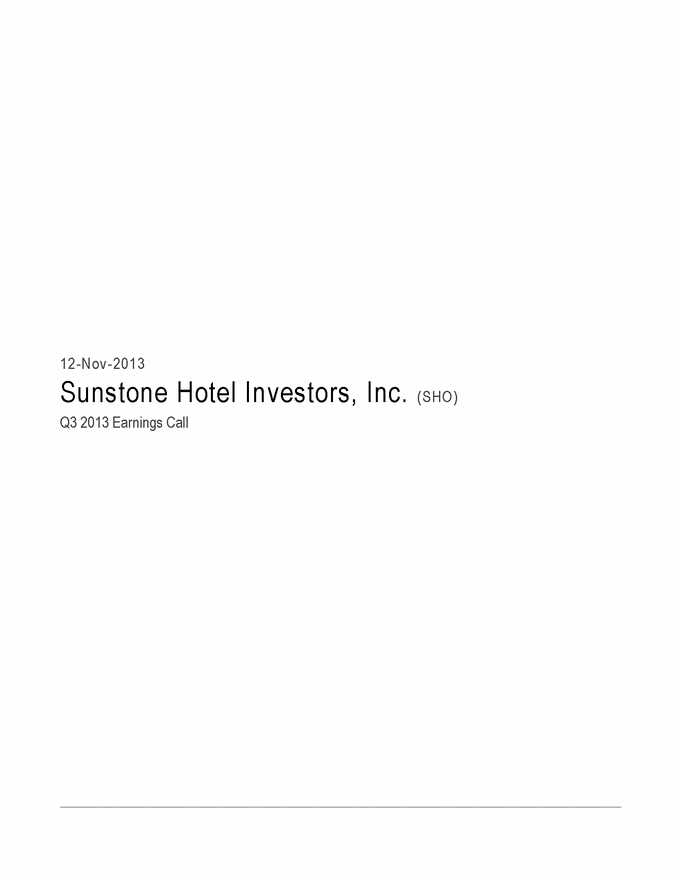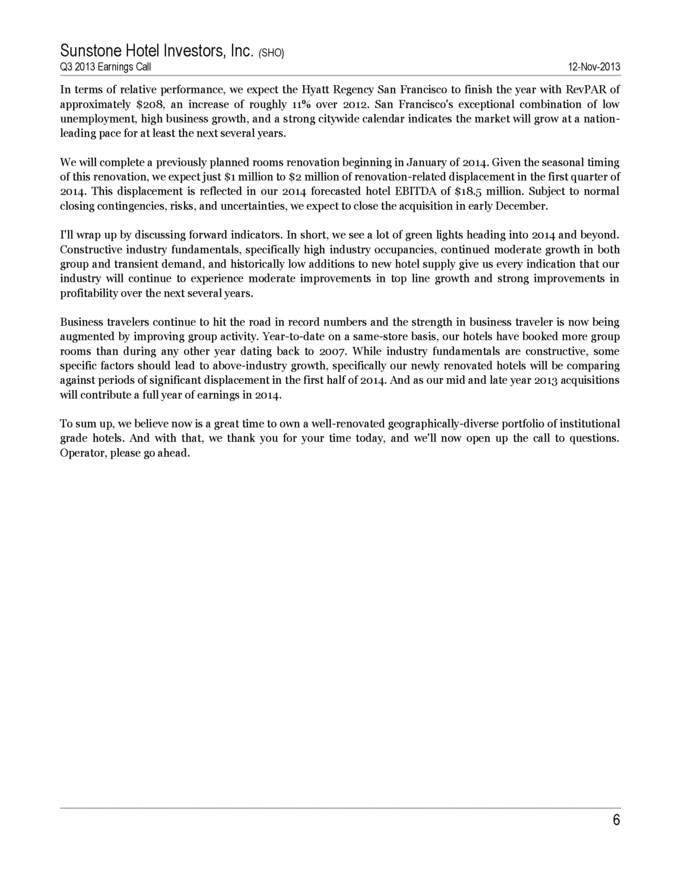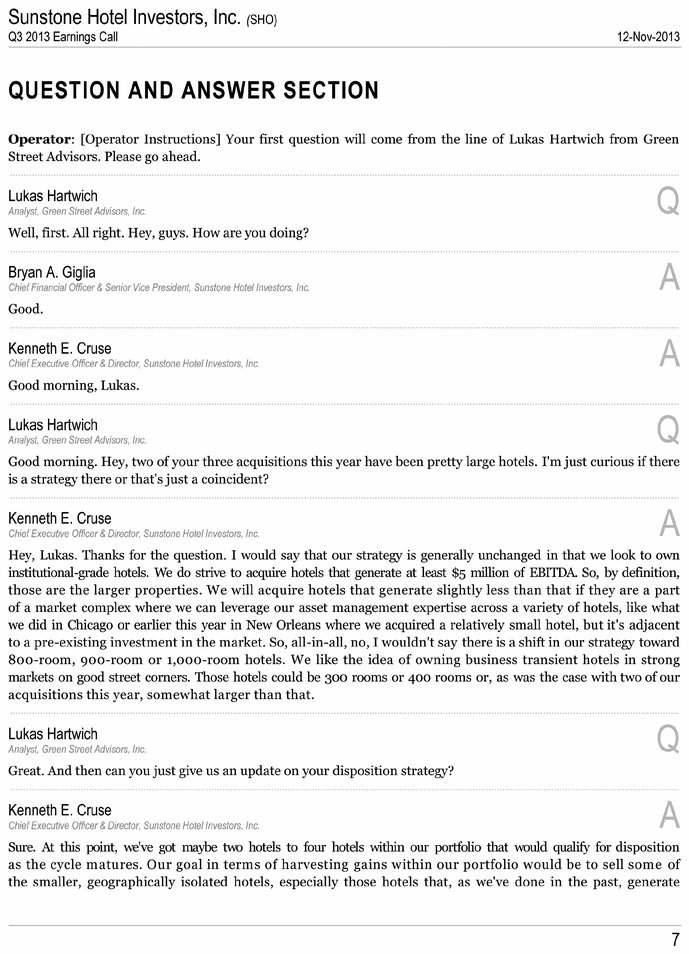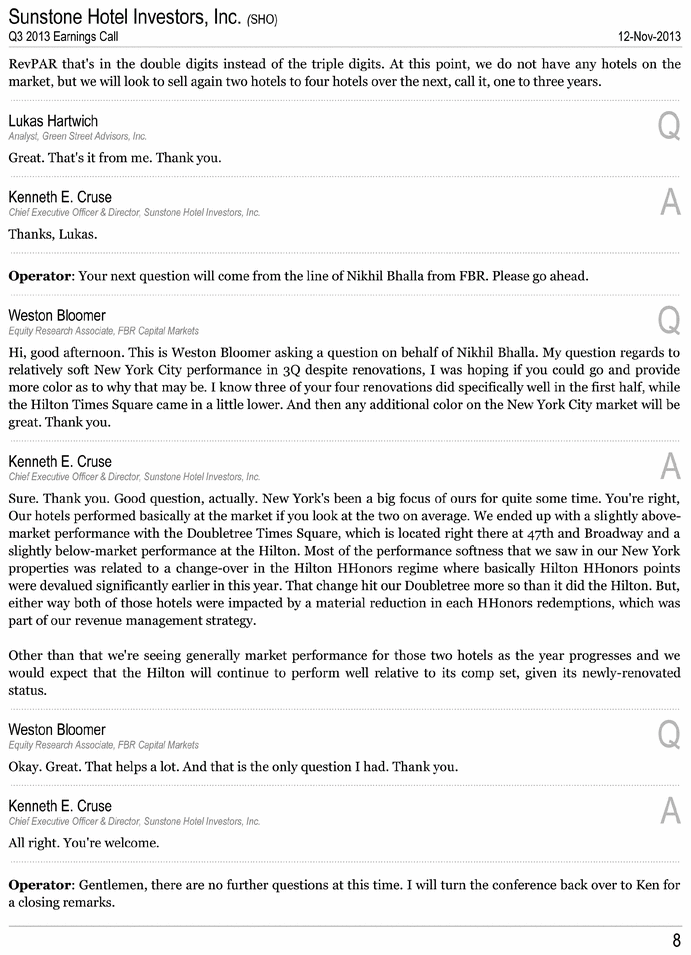Attached files
| file | filename |
|---|---|
| 8-K - 8-K - Sunstone Hotel Investors, Inc. | a13-24293_18k.htm |
Exhibit 99.1
|
|
[LOGO] 12-Nov-2013 Sunstone Hotel Investors, Inc. (SHO) Q3 2013 Earnings Call |
|
|
CORPORATE PARTICIPANTS Bryan A. Giglia Chief Financial Officer & Senior Vice President, Sunstone Hotel Investors, Inc. Kenneth E. Cruse Chief Executive Officer & Director, Sunstone Hotel Investors, Inc. OTHER PARTICIPANTS Lukas Hartwich Analyst, Green Street Advisors, Inc. Weston Bloomer Equity Research Associate, FBR Capital Markets MANAGEMENT DISCUSSION SECTION Operator: Ladies and gentlemen, thank you for standing by. Welcome to the Sunstone Hotel Investors Third Quarter Earnings Call. At this time, all participants are in a listen-only mode. Following the presentation, we will conduct a question-and-answer session and instructions will be provided at that time. [Operator Instructions] I would like to remind everyone that this conference call is being recorded today, November 12, 2013. I will now turn the conference over to Mr. Bryan Giglia, Chief Financial Officer. Please go ahead. Bryan A. Giglia Chief Financial Officer & Senior Vice President, Sunstone Hotel Investors, Inc. Thank you, and good morning, everyone. By now, you should have all received a copy of our third quarter earnings release and our supplemental, which we released yesterday. If you do not yet have a copy, you can access them on our website at www.sunstonehotels.com. Before we begin this call, I'd like to remind everyone that this call contains forward-looking statements that are subject to risks and uncertainties, including those described in our prospectuses, 10-Ks, 10-Qs, and other filings with the SEC, which could cause actual results to differ materially from those projected. We caution you to consider those factors in evaluating our forward-looking statements. We also note that this call may contain non-GAAP financial information, including EBITDA, adjusted EBITDA, FFO, adjusted FFO, and hotel EBITDA margins. We are providing that information as a supplement to information prepared in accordance with generally accepted accounting principles. With us on the call today are Ken Cruse, Chief Executive Officer; John Arabia, President; Marc Hoffman, Chief Operating Officer; and Robert Springer, our Chief Investment Officer. After our prepared remarks, we will be available to answer your questions. |
|
|
Before I turn the call over to Ken, I'd like to remind everyone that with the beginning of this year we adopted calendar reporting quarters for our 10 Marriott-managed hotels similar to the rest of our portfolio, which also reports on a calendar basis. Last year, reporting for our Marriott-managed hotels was based on a 13-period fiscal calendar. As a result of this calendar shift, our revenues, net income, adjusted EBITDA and adjusted FFO for Q3 2013 include eight additional days of operations for our Marriott managed hotels as compared with Q3 2012. With that, I'd like to turn the call over to Ken. Please go ahead. Kenneth E. Cruse Chief Executive Officer & Director, Sunstone Hotel Investors, Inc. Thanks, Bryan, and thank you all for joining us, keeping the late timing of our call and since we have already preannounced our quarterly results, we'll keep our prepared remarks very brief today. I'll quickly walk through some highpoints on operations and I'll provide a status update on our recent Boston Park Plaza investment as well as our pending acquisition of the Hyatt Regency San Francisco. Finally, I'll conclude our prepared remarks with a discussion on leading indicators before opening up the call to questions. First, with respect to the third quarter, our results exceeded our prior guidance in all areas. This was a model quarter in many ways. Our hotels achieved strong revenue growth in both rooms and food and beverage, and our margins expanded materially due to disciplined expense controls at both the departmental and G&A level. Specifically, our comparable RevPAR grew at a healthy 7.6% while our same-store hotel EBITDA margin expanded by 220 basis points. This strong hotel-level performance led to a better than 30% increase in our adjusted FFO per diluted share as compared to the third quarter of 2012. We're now seeing solid trends from a broad range of demand segments. The ongoing resilience of the U.S. business travelers, our largest component of demand, is now being augmented by strengthening group booking activity and positive corporate account negotiations. Moreover, as expected, our recently renovated hotels are generally growing at rates above our portfolio average as we trade renovation displacement for outsized growth. Specifically, for the third quarter, our Renaissance Westchester delivered nearly 9% RevPAR growth. Our Hyatt Newport Beach delivered nearly 11% RevPAR growth, and our Hyatt Chicago delivered better than 12% RevPAR growth. Additionally, our Renaissance Washington, DC, which we renovated in 2012, delivered nearly 43% RevPAR growth in the third quarter. This exceptional growth was achieved in the context of a relatively soft overall market in Washington, D.C. Breaking down the components of our third quarter RevPAR, our top line growth was fairly well balanced between rate and occupancy. Our average daily rate grew by $5.56 to $179.32, while our occupancy increased by 350 basis points to 84.9%. We realized strong occupancy gains in both our Renaissance Washington, DC and our Hilton San Diego Bayfront. Also our three Chicago properties performed very well with RevPAR up combined 8.7% over the third quarter of 2012. As many of you are aware, thus far this cycle group room rates have not grown as quickly as our other demand segment such as business transient. Recently, we've seen improving trends on both group room rates and group ancillary spend. For example, our overall group rate increased by 4.3% in the third quarter, which was slightly better than the average transient rate growth of 3.2%. Also, our food and beverage spend per group room increased by a solid 7.9% to $102.72 in the third quarter. |
|
|
As we look forward to 2014, our group booking pace for all 28 hotels is positive 3.1%, which is similar to the overall group pace we're seeing in 2013, and represents a nice improvement over where we stood last quarter on 2014 group pace. 21 of our 28 hotels are showing pace growth in excess of 10% in 2014. I should also note that while 2014 group bookings into our Renaissance Washington, DC are solid by historical standards as the hotel is having an exceptionally strong group year 2013 with group business up 22% the hotel's pace in 2014 is down as compared to 2013. On the positive side, our four hotels that underwent major renovations in 2013 are now showing 24% growth in group pace for 2014. I'll spend a minute on transient demand trends. Our portfolio is compromised primarily of urban business hotels. Accordingly, more than 60% of our overall demand comes from individual non-group travelers. We refer to this demand segment as transient demand. Individual business travelers comprise the bulk of our transient demand segment with high-rated premium transient, comprising 16% of our total demand. At the other end of the spectrum, government transient business, which has been a focus lately, comprises only about 3% of our overall demand. While political tactics such as sequestration and the recent federal government shutdown will have a short-term effect on our operations, these impacts are primarily isolated background noise, in our opinion. Let me put some things in perspective. In the third quarter, our government business was down 18% at an average rate of just $142. At the same time, our premium transient business was up 15% at an average rate of $247. In short, in spite of the childish behavior in Washington, D.C., the real engines of our economy, American corporations, are doing their part to drive continued growth, and in the process, businesses continue to send travelers on the road in record numbers. Turning now to operational efficiencies. As I noted, our operators did an exceptional job controlling costs in the third quarter. Our rooms' departmental expense per occupied room declined by 0.6% during the quarter, as our operators continued to streamline operations. Additionally, our hotels benefited from disciplined cost containment efforts in both G&A and energy expenses. Over the past three quarters, we've implemented new energy efficiency programs in roughly one quarter of our portfolio. These initiatives have helped to reduce our quarterly energy cost with portfolio-wide cost per occupied room declining by 6.9% in the third quarter. As we continue implementing these energy savings programs, we're targeting returns in excess of 20% on our invested capital. As I said, clearly, this was a model quarter in many ways. And we thank our operators and our team for the solid execution across the board. Moving on to recent and pending transactions, improving the quality and scale of our portfolio while gradually deleveraging our balance sheet in a shareholder-friendly way has been, and remains, our core strategic objective. We've recently either executed on or are in the process of executing on various transactions that advance this objective. For example, in the third quarter, we acquired a well located, but undercapitalized 1,053 room hotel called the Boston Park Plaza. When we announced this deal, we noted a broad range of value-add opportunities. And over the past several months, we've made good progress toward capitalizing on these opportunities. For example, our near-term goal of leasing the hotel's roughly 43,000-square feet of vacant retail space is moving forward well. |
|
|
We're finalizing terms with a high-end restaurant operator and a luxury retailer. And we're negotiating with two state-of-the-art fitness operators. Each of these leases will generate a new stream of profitability for the hotel and, importantly, will serve to enhance and complement the overall guest experience of this property. We expect to have all retail tenants in place during 2014. As we previously discussed, the Boston Park Plaza hotel has not been maintained to a level that we believe will maximize its competitiveness or our return on investments over the long run. For example as the hotel currently ranks 68th on TripAdvisor among 77 Boston-area hotels, we see improving the hotel's appeal to a higher-rated travelers as a clear and compelling opportunity to drive value. Accordingly, we've developed a comprehensive repositioning plan for the asset, which will begin with the completion of various infrastructure projects starting this year. The phase 1 infrastructure work will entail materially improving the building's heating and cooling, elevators, roofs and facade. Additionally, we've already addressed what was previously one of the top complaints by implementing a new state-of-the-art Internet connectivity overlay. We believe that by simply addressing these basic services, we will meaningfully improve the guest experience at the hotel. In addition to our phase 1 infrastructure work, we're preparing for a more comprehensive rooms and public space renovations during the winter and early spring months of 2015. Through this renovation, we intend to embrace the hotel's historic character while creating a fresher, cleaner and more functional guest environment defined by elements of modern and contemporary style. While we believe the effect of our planned renovation will be transformative, it's important to note that the overall process and scope of the renovation will not differ meaningfully from our other typical rooms and public space renovations we've completed in a number of our hotels over the last several years. To be clear, we do not intend to take this hotel off-line to complete the renovation work. That said, given the high occupancy rates of the hotel, even in the seasonally slower winter months, this renovation will entail a tradeoff of some short-term displacement to what we expect will be a profound improvement in the hotel's long-term competitiveness. We're budgeting roughly $30 million for Phase I improvements and roughly $55 million for Phase II improvements. Turning now to our pending acquisition of the 802-room Hyatt Regency San Francisco, we're purchasing this well located fee-simple hotel for $262.5 million or approximately $327,000 per key. Our gross purchase price equates to a 14.2x multiple on 2014 forecasted hotel EBITDA of $18.5 million and a better than 6% capitalization rate on 2014 forecasted hotel net operating income. This acquisition represents our first foray into the high barrier to entry downtown San Francisco hotel market. The hotel's location on Market Street directly across the street from the Ferry Terminal Building and in the center of the financial district gives it a strong and well protected competitive advantage. The acquisition will be funded with cash proceeds from our recent common share equity offering. We will not incur or assume any debt in connection with this acquisition. As a result, this acquisition will both improve the quality, scale and geographic diversity of our portfolio and will also materially enhance our credit profile and financial flexibility. The hotel is anticipated to benefit from San Francisco's favorable supply and demand dynamic and, importantly, there is over 3 million square feet of new, high-end office space under construction within a five-block radius of the property. |
|
|
In terms of relative performance, we expect the Hyatt Regency San Francisco to finish the year with RevPAR of approximately $208, an increase of roughly 11% over 2012. San Francisco's exceptional combination of low unemployment, high business growth, and a strong citywide calendar indicates the market will grow at a nation-leading pace for at least the next several years. We will complete a previously planned rooms renovation beginning in January of 2014. Given the seasonal timing of this renovation, we expect just $1 million to $2 million of renovation-related displacement in the first quarter of 2014. This displacement is reflected in our 2014 forecasted hotel EBITDA of $18.5 million. Subject to normal closing contingencies, risks, and uncertainties, we expect to close the acquisition in early December. I'll wrap up by discussing forward indicators. In short, we see a lot of green lights heading into 2014 and beyond. Constructive industry fundamentals, specifically high industry occupancies, continued moderate growth in both group and transient demand, and historically low additions to new hotel supply give us every indication that our industry will continue to experience moderate improvements in top line growth and strong improvements in profitability over the next several years. Business travelers continue to hit the road in record numbers and the strength in business traveler is now being augmented by improving group activity. Year-to-date on a same-store basis, our hotels have booked more group rooms than during any other year dating back to 2007. While industry fundamentals are constructive, some specific factors should lead to above-industry growth, specifically our newly renovated hotels will be comparing against periods of significant displacement in the first half of 2014. And as our mid and late year 2013 acquisitions will contribute a full year of earnings in 2014. To sum up, we believe now is a great time to own a well-renovated geographically-diverse portfolio of institutional grade hotels. And with that, we thank you for your time today, and we'll now open up the call to questions. Operator, please go ahead. |
|
|
QUESTION AND ANSWER SECTION Operator: [Operator Instructions] Your first question will come from the line of Lukas Hartwich from Green Street Advisors. Please go ahead. Lukas Hartwich Analyst, Green Street Advisors, Inc. Q Well, first. All right. Hey, guys. How are you doing? Bryan A. Giglia Chief Financial Officer & Senior Vice President, Sunstone Hotel Investors, Inc. A Good. Kenneth E. Cruse Chief Executive Officer & Director, Sunstone Hotel Investors, Inc. A Good morning, Lukas. Lukas Hartwich Analyst, Green Street Advisors, Inc. Q Good morning. Hey, two of your three acquisitions this year have been pretty large hotels. I'm just curious if there is a strategy there or that's just a coincident? Kenneth E. Cruse Chief Executive Officer & Director, Sunstone Hotel Investors, Inc. A Hey, Lukas. Thanks for the question. I would say that our strategy is generally unchanged in that we look to own institutional-grade hotels. We do strive to acquire hotels that generate at least $5 million of EBITDA. So, by definition, those are the larger properties. We will acquire hotels that generate slightly less than that if they are a part of a market complex where we can leverage our asset management expertise across a variety of hotels, like what we did in Chicago earlier this year in New Orleans where we acquired a relatively small hotel, but it's adjacent to a pre-existing investment in the market. So, all-in-all, no, I wouldn't say there is a shift in our strategy toward 800-room, 900-room or 1,000-room hotels. We like the idea of owning business transient hotels in strong markets on good street corners. Those hotels could be 300 rooms or 400 rooms or, as was the case with two of our acquisitions this year, somewhat larger than that. Lukas Hartwich Analyst, Green Street Advisors, Inc. Q Great. And then can you just give us an update on your disposition strategy? Kenneth E. Cruse Chief Executive Officer & Director, Sunstone Hotel Investors, Inc. A Sure. At this point, we've got maybe two hotels to four hotels within our portfolio that would qualify for disposition as the cycle matures. Our goal in terms of harvesting gains within our portfolio would be to sell some of the smaller, geographically isolated hotels, especially those hotels that, as we've done in the past, generate |
|
|
RevPAR that's in the double digits instead of the triple digits. At this point, we do not have any hotels on the market, but we will look to sell again two hotels to four hotels over the next, call it, one to three years. Lukas Hartwich Analyst, Green Street Advisors, Inc. Q Great. That's it from me. Thank you. Kenneth E. Cruse Chief Executive Officer & Director, Sunstone Hotel Investors, Inc. A Thanks, Lukas. Operator: Your next question will come from the line of Nikhil Bhalla from FBR. Please go ahead. Weston Bloomer Equity Research Associate, FBR Capital Markets Q Hi, good afternoon. This is Weston Bloomer asking a question on behalf of Nikhil Bhalla. My question regards to relatively soft New York City performance in 3Q despite renovations, I was hoping if you could go and provide more color as to why that may be. I know three of your four renovations did specifically well in the first half, while the Hilton Times Square came in a little lower. And then any additional color on the New York City market will be great. Thank you. Kenneth E. Cruse Chief Executive Officer & Director, Sunstone Hotel Investors, Inc. A Sure. Thank you. Good question, actually. New York's been a big focus of ours for quite some time. You're right, Our hotels performed basically at the market if you look at the two on average. We ended up with a slightly above-market performance with the Doubletree Times Square, which is located right there at 47th and Broadway and a slightly below-market performance at the Hilton. Most of the performance softness that we saw in our New York properties was related to a change-over in the Hilton HHonors regime where basically Hilton HHonors points were devalued significantly earlier in this year. That change hit our Doubletree more so than it did the Hilton. But, either way both of those hotels were impacted by a material reduction in each HHonors redemptions, which was part of our revenue management strategy. Other than that we're seeing generally market performance for those two hotels as the year progresses and we would expect that the Hilton will continue to perform well relative to its comp set, given its newly-renovated status. Weston Bloomer Equity Research Associate, FBR Capital Markets Q Okay. Great. That helps a lot. And that is the only question I had. Thank you. Kenneth E. Cruse Chief Executive Officer & Director, Sunstone Hotel Investors, Inc. A All right. You're welcome. Operator: Gentlemen, there are no further questions at this time. I will turn the conference back over to Ken for a closing remarks. |
|
|
Kenneth E. Cruse Chief Executive Officer & Director, Sunstone Hotel Investors, Inc. Excellent. Look, we appreciate everyone's time today, and we look forward to speaking with many of your over the next few days at the NAREIT conference. Thank you. Operator: Ladies and gentlemen, this concludes the conference call for today. Thank you for participating and please disconnect your lines. |









